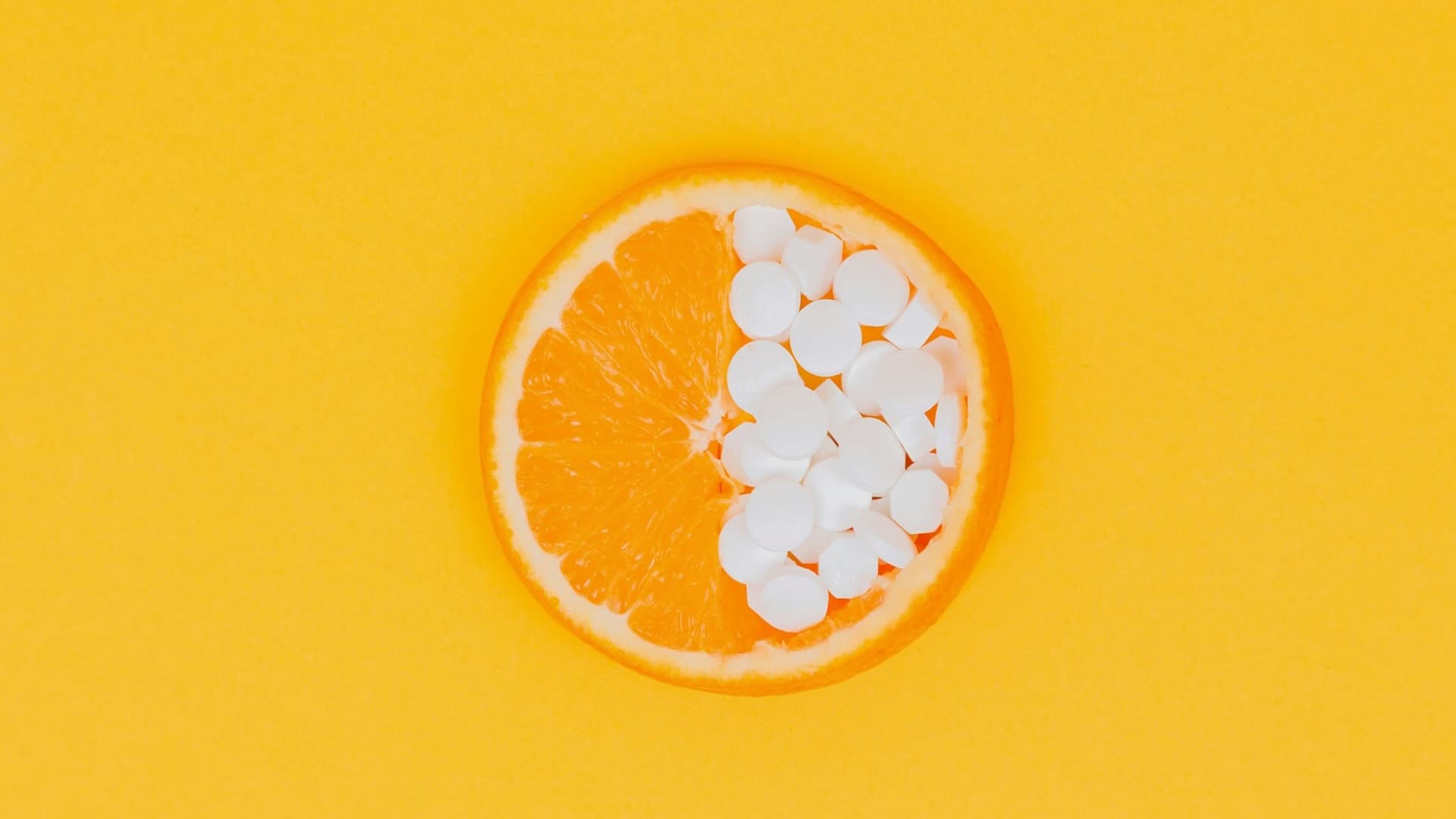
Vitamin-C
Vitamin C, or ascorbic acid, is an essential water-soluble nutrient that the human body cannot produce on its own [42][33]. It plays a critical role in numerous physiological processes, including immune system function, collagen synthesis for skin and tissue repair, and iron absorption [24]. While a balanced diet rich in fruits and vegetables is the primary and often sufficient source, vitamin C supplementation is widely used with the aim of bolstering immune defense, improving skin health, and potentially reducing the risk of chronic disease [42].
Vitamin C's primary functions stem from its roles as a powerful antioxidant and an essential cofactor for enzymatic reactions [24][30]. As a water-soluble antioxidant, it protects cells from damage caused by free radicals, which are unstable molecules linked to chronic diseases and aging [42][24]. It also helps regenerate other antioxidants in the body, such as vitamin E [25][38].
Its most impactful and well-established benefits include:
- Immune System Support: Vitamin C is crucial for a robust immune response. It supports the integrity of epithelial barriers, the body's first line of defense, and enhances the function of white blood cells like neutrophils and lymphocytes, which are essential for fighting infection [11][26][12]. It accumulates in these immune cells, protecting them from oxidative damage and improving their ability to find and destroy pathogens [28][7].
- Collagen Synthesis: The vitamin is indispensable for the production of collagen, the body's most abundant protein, which provides structure to skin, bones, tendons, and blood vessels [30][32]. It acts as a necessary cofactor for the enzymes that stabilize the collagen molecule, making it vital for wound healing and maintaining skin elasticity [4][1].
The evidence for other widely claimed benefits is more nuanced:
- The Common Cold: For the general population, supplementation does not prevent the common cold [42][14]. However, regular intake may modestly reduce the duration of a cold by 8% in adults and 14% in children, and may also lessen symptom severity [2][41]. The benefit is significant for individuals under extreme physical stress, where supplementation can cut the incidence of colds by up to 50% [8][21].
- Cardiovascular Health & Cancer: The picture is complex. While diets high in vitamin C from fruits and vegetables are associated with a lower risk of cardiovascular disease and some cancers, large-scale clinical trials on vitamin C supplements have not consistently demonstrated a preventive effect [31][25][6]. Research into high-dose intravenous vitamin C as a potential cancer therapy is ongoing, leveraging its ability to act as a pro-oxidant at very high concentrations [33][18].
A typical implementation of vitamin C supplementation involves adhering to established dosage guidelines while being mindful of potential pitfalls.
- Dosage: The Recommended Dietary Allowance (RDA) is 90 mg/day for adult men and 75 mg/day for adult women, amounts easily obtained from a diet rich in fruits and vegetables [42]. Smokers are advised to consume an additional 35 mg daily due to increased oxidative stress [11]. For prophylactic immune support, a daily intake of 100–200 mg is suggested to optimize tissue levels [27][11]. The Tolerable Upper Intake Level (UL) for adults is 2,000 mg (2 grams) per day [42][18].
- Application: To maximize absorption and minimize side effects, it is recommended to take supplements with food and split larger doses (e.g., taking two 500 mg doses instead of one 1,000 mg dose) throughout the day [15][22]. The body's ability to absorb vitamin C decreases as the dose increases; absorption drops to less than 50% for single doses over 1,000 mg [11].
Common Pitfalls:
- Excessive Intake: Exceeding the 2,000 mg UL can lead to gastrointestinal side effects like diarrhea, nausea, and stomach cramps [42][18]. High doses are also associated with an increased risk of kidney stones, particularly in men [37][40].
- Drug Interactions: High-dose vitamin C can interfere with medications, including blood thinners (Warfarin), statins, some chemotherapy drugs, and estrogen-containing medications [5][2][13].
- Health Conditions: Supplementation can be harmful for individuals with certain conditions. It can worsen iron overload in those with hemochromatosis, increase kidney stone risk in those with kidney disease, and cause red blood cell breakdown in people with G6PD deficiency [22][13][17].
Pros
As the body cannot synthesize it, an adequate intake is non-negotiable for fundamental processes like collagen formation, wound healing, and maintaining cartilage, bones, and teeth [24].
It significantly improves the absorption of non-heme iron from plant-based foods, which is beneficial for preventing iron deficiency [29].
Cons
Can taking vitamin C prevent me from getting a cold?
Do I need a supplement if I eat a healthy diet?
If I get a cold, will taking vitamin C help?
Is it possible to take too much vitamin C?
Is one form of vitamin C supplement better than another?